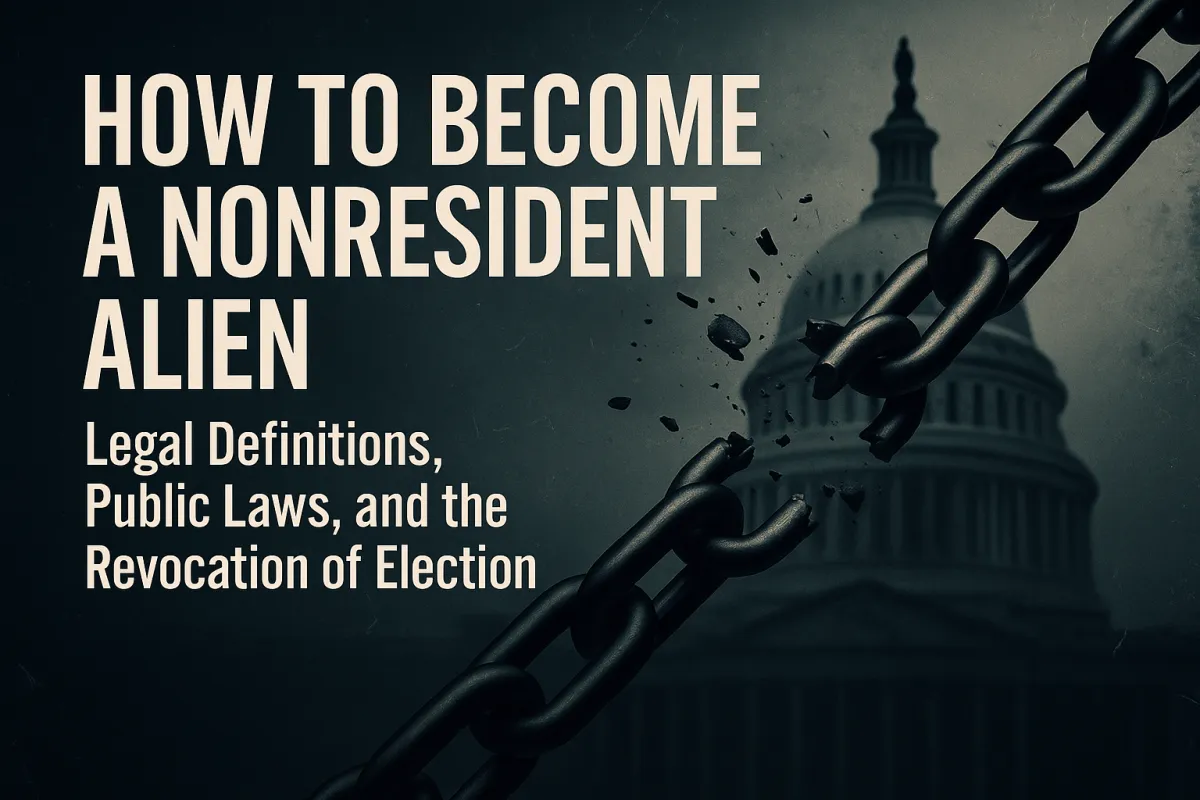
How to Become a Nonresident Alien: Legal Definitions, Public Laws, and the Revocation of Election
The status of a Nonresident Alien (NRA) under U.S. law is one of the most misunderstood but important positions in the realm of taxation and jurisdiction. Many assume it applies only to foreign nationals living abroad, yet the legal framework shows it is also a status available to those born in one of the fifty states of the Union who never lawfully entered into the jurisdiction of the statutory “United States.” To understand how to become a nonresident alien, we must look at the precise legal definitions provided in Black’s Law Dictionary, the U.S. Code, and the Internal Revenue Manual (IRM)—and then connect them with the lawful remedy of the Revocation of Election (ROE).

Defining the “United States”
According to 28 U.S.C. § 3002(15)“
United States” means—
(A) a Federal corporation;
(B) an agency, department, commission, board, or other entity of the United States; or
(C) an instrumentality of the United States.
This statute reveals that the “United States” is not simply the geographic nation of fifty states, but a federal corporation headquartered in the District of Columbia.
The U.S. Supreme Court has affirmed this territorial limitation. In Foley Bros. v. Filardo, 336 U.S. 281 (1949), the Court held:
“Legislation of Congress, unless a contrary intent appears, is meant to apply only within the territorial jurisdiction of the United States.”

The District of Columbia as Legal Territory
Black’s Law Dictionary (6th ed.) defines the District of Columbia as a federal district under the exclusive legislative control of Congress. Article I, Section 8, Clause 17 of the Constitution created this 10-mile-square federal zone.
It is in this district that the federal “United States” corporation exercises full power. The Internal Revenue Code recognizes this explicitly in 26 U.S.C. § 7408(d) which states that citizens or residents outside the “United States” are to be treated as residents of the District of Columbia.

The Legal Definition of “Person”
The word “person” is often assumed to mean a living man or woman. Legally, however, it carries a far broader meaning. Under 28 U.S.C. § 3002(10)
“Person” includes a natural person (including an individual Indian), a corporation, a partnership, an unincorporated association, a trust, or an estate, or any other public or private entity, including a State or local government or an Indian tribe.
This means that when tax statutes apply to “persons,” they are binding primarily on corporations, trusts, estates, and other legal fictions. When a living man voluntarily files under these statutes, he is treated as a corporate entity tied to the United States federal corporation.

Citizenship and U.S. Code
The distinction is further reinforced by 18 U.S.C. § 911
“Whoever falsely and willfully represents himself to be a citizen of the United States shall be fined under this title or imprisoned not more than three years, or both.”
This statute underscores that the status of “citizen of the United States” is specific and statutory—anchored in the federal corporation of D.C. To misrepresent one’s status as such is to voluntarily bind oneself to federal jurisdiction.

Nonresident Alien in Tax Law
The Internal Revenue Code formally divides aliens into two categories under 26 C.F.R. § 1.871-1
Resident aliens: Taxed the same as “citizens” of the United States, on worldwide income.
Nonresident aliens: Taxed only on U.S.-source income “effectively connected with a trade or business in the United States.”
The regulation also makes clear that nonresident aliens may elect under 26 U.S.C. § 6013(g) or (h) to be treated as residents. This election is voluntary and is the doorway through which many American Nationals have been drawn into the federal tax system.
The Revocation of Election (ROE)

The Revocation of Election is the statutory remedy that allows an American National to terminate any prior election that made them appear as a resident taxpayer.
26 U.S.C. § 6013(g)(4)(A) provides: “An election under this subsection shall terminate at the earliest of the following times…” including upon revocation by the taxpayer.
Once revoked, the election cannot be reinstated, ensuring permanent separation between the living man and the statutory taxpayer
The IRM confirms that such elections are voluntary and can be revoked by notice to the IRS.
The effect is to distinguish the living man from the dead entity/person tied to the United States corporation.

Unincorporated Nonprofit Association (UNA)
A powerful tool for remaining outside statutory jurisdiction is the Unincorporated Nonprofit Association (UNA). Defined in the Uniform Unincorporated Nonprofit Association Act, a UNA is:
An organization of two or more persons, unincorporated, formed for a common nonprofit purpose, with the capacity to own property, contract, and sue or be sued.
Because it is unincorporated, a UNA avoids many statutory hooks that apply to corporations or registered entities. When paired with nonresident alien status, it allows income and contractual relations to be tied to the statutory “person” while keeping the living man outside the jurisdiction of the federal corporation.
The Bigger Picture: Person vs. Living Man
The legal framework paints a consistent picture:
United States is a federal corporation headquartered in D.C. (28 U.S.C. § 3002(15)
District of Columbia is the exclusive legislative zone of Congress.
Person means a corporation, trust, or artificial entity (28 U.S.C. § 3002(10)
Citizen of the United States is a statutory status tied to D.C. (18 U.S.C. § 911)
Nonresident Alien means one who is not a resident or citizen of the statutory United States (26 C.F.R. § 1.871-1)
Revocation of Election is the statutory exit, permanently severing ties to resident taxpayer status (26 U.S.C. § 6013(g)(4)(A)
UNA provides a private, unincorporated structure recognized in law.
Conclusion
To become a nonresident alien is not to evade law, but to understand it. By defining the “United States” as a federal corporation, recognizing that “person” refers to legal fictions, and using statutory remedies like the Revocation of Election, one distinguishes the living man from the corporate citizen. When paired with a Unincorporated Nonprofit Association, this creates a lawful framework where the living man remains sovereign, while the artificial person remains in commerce.
As the federal court stated in Economy Plumbing & Heating v. U.S., 470 F.2d 585 (1972):
“Revenue laws relate to taxpayers and not to non-taxpayers. The latter are without their scope. … They are neither the subject nor the object of federal revenue laws.”
Properly executed, this path establishes nonresident alien status lawfully, with references rooted in public law, Black’s Law Dictionary, and the IRS’s own Internal Revenue Manual.
Comparison Chart: Living Man vs. Person vs. Citizen vs. Nonresident Alien

Pay No More Tax - Song for Non-Resident Alien
Join the growing Nonresident Alien team today and step into the private side of the law.
📩 Contact Jason or Albert to get started.
================================


